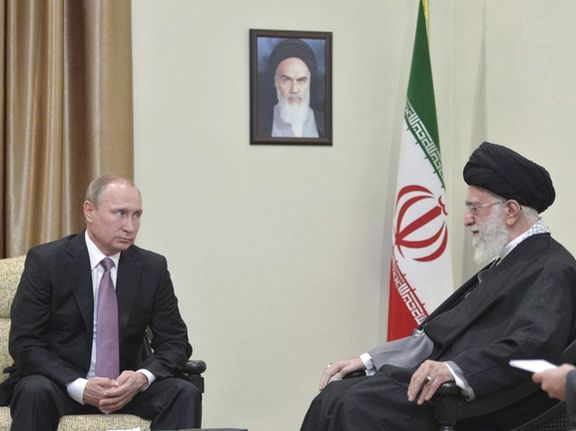In Iran Tuesday, Putin Has Grain, Syria On Agenda

President Vladimir Putin’s trip to Tehran Tuesday seems set by the Kremlin to emphasize Russia’s continuing role in the Middle East despite the Ukraine crisis.

President Vladimir Putin’s trip to Tehran Tuesday seems set by the Kremlin to emphasize Russia’s continuing role in the Middle East despite the Ukraine crisis.
Yuri Ushakov, foreign policy advisor to the Russian president, told reporters in Moscow Monday that a planned meeting with Ali Khamenei, Iran’s supreme leader, was “very important” and would reflect a “trusting dialogue…on the most important issues on the bilateral and international agenda.”
Putin is also expected to meet in Tehran with visiting Turkish president Recep Tayyip Erdogan, partly to follow up trilateral discussions with Ukraine over establishing a corridor through Turkey for the export of Ukrainian grain, a move that may be soon endorsed by the United Nations. At the same time, Moscow is well aware that its own grain exports are a potential sweetener, with Dmitry Patrushev suggesting in June Russia would send supplies to “countries that are friendly to us”.
While Erdogan, despite sending arms to Ukraine, has acted as a mediator between the warring neighbors, he also wants to liaise with both Russia and Iran over Syria, where Ankara is considering stepping up an armed intervention, aimed partly in support of Syrian rebels and partly against Kurdish forces allied with Kurdish rebels in Turkey. Iran opposes the Turkish presence, which is tolerated by both Russia and the US.

While Putin has left Russia only once since the Ukraine crisis erupted in February – travelling in June to Tajikistan and for the Sixth Caspian Summit in Turkmenistan – his trip to Iran is seen as an important chance to assert Russia’s continuing role in the Middle East immediately after the visit of United States President Joe Biden to Israel and Saudi Arabia, which concluded Saturday evening after Biden told the summit of nine Arab states he would not leave in the Middle East “a vacuum to be filled by China, Russia or Iran.”
Moscow’s regional leverage
Russia wants to maintain leverage gained from years of nuanced military and diplomatic regional efforts – including its 2015 military onslaught in Syria that tipped war in favor of President Bashar al-Assad, its intelligence sharing and political ties with Israel, its coordination with Saudi Arabia of global oil supplies through Opec+, and its diplomatic cooperation with Iran.
The Iran-Russia relationship has been well discussed in both Tehran, where some politicians regularly criticize Moscow’s continuing role in Iran’s nuclear talks with world powers, and in Washington. US officials have lately alleged that Russian officers visited Iran in June and July to look into possibilities for deploying Iranian-made attack drones for the Ukraine war. President Ebrahim Raisi met Putin in Moscow in January, and again at the Caspian Summit in June, when the Iranian president joined the leaders of Russia, Turkmenistan, Kazakhstan, and Azerbaijan, and expressed a desire to build economic ties.
But many analysts argue that Russia and Iran are far from partners, whether in arms or business. Bilateral trade rose to $4 billion in 2021, but this is far less that, for example, Russia’s trade with Turkey at $33 billion, while Moscow’s exports to Iran are mainly foodstuffs, which are less vulnerable to US third-party sanctions than other sectors.
And while Tehran has been benefiting from rising oil prices, its sales to China, which make up most of its exports dues to US sanctions, have been hampered by Moscow selling to Beijing at a discount after being shut out of much of western Europe due to the Ukraine invasion.